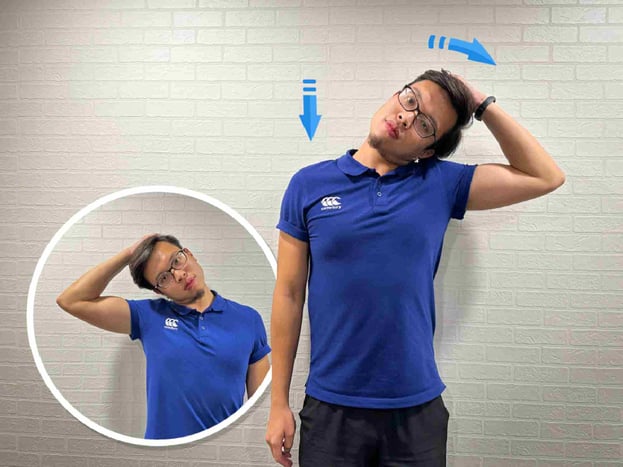Neck pain is common. About 2 in 3 people will experience neck pain at some point. Usually, there is no obvious cause, and the pain is gone within a few weeks. For 1 in 7 people, the neck pain lasts longer than 6 months. This is known as chronic neck pain.
What are the causes of neck pain?
Given that the neck is under constant strain because it supports the head, it is susceptible to injuries and other conditions that inhibit motion and ultimately cause pain. Typical causes can include:
- Torticollis (Wryneck): This can cause neck pain due to the muscle of the neck cramping and cause your neck to twist to one side.
- Muscle strains can occur as a result of overuse. Contrary to what some might believe, this can happen due to a more sedentary lifestyle, including sitting hunched over a desk. This can trigger neck muscle strain. It can also be exacerbated by regularly looking at a phone or reading in bed. Sometimes the muscles on one side of your neck can be so tight, hard, and stiff that your neck feels stuck. It can be very painful, and the tension might tilt your head to one side. We call this "torticollis".
- Injuries caused by sudden head jerks can strain the soft tissue of the neck. This is most commonly seen during collisions, most noticeably in car accidents but can also happen in sports and other scenarios.
- Worn joints are a curse of ageing. Osteoarthritis is when the joints between the vertebrae can wear out and change. In response to this wear and tear, the body often forms bone spurs (bony projections) that can cause issues in extension and flexion motions and cause chronic neck pain and even Vertebral fractures.
- Nerve compression results from bone spurs in the vertebrae or herniated discs. A herniated disc is when the cartilage disc that sits between your neck vertebrae (intervertebral disc or disc) is ruptured, causing the softer tissue to slip through the cracks of the cartilage and press against a nerve pathway that runs to an arm. With a neck hernia, the neck pain is often not the worst. You mainly have pain in one arm. It is often a sharp cutting or shooting pain. Sometimes you also have tingling or less strength in your arm.
- Diseases some diseases such as meningitis, cancer or rheumatoid arthritis can have symptoms such as neck pain.
What are the symptoms of neck pain?
Common neck pain can come on suddenly or more gradually. It can be severe or aching. When severe pain, certain postures and movements are sometimes no longer possible. The pain may be accompanied by stiffness and radiate to the head, shoulder, or arm, making it difficult to do daily tasks normally.
When do I need an X-ray for my neck pain?
In neck pain, an X-ray usually does not provide useful information. It can confuse. Any abnormalities seen by an X-ray scan rarely have anything to do with neck pain. Even in people who never have neck pain, neck abnormalities are rarely found in an X-ray scan.
How to treat neck pain?
Necks are extremely important and an incorrect treatment can cause severe consequences. Your neck must get the treatment it needs. It is important to see an orthopaedic specialist or GP if:
- You suddenly get a stiff neck (the chin cannot touch the chest) and you have one of the following accompanying symptoms:
- a fever
- being drowsy or confused
- big headache
- throwing up several times
- purple-red rash on the skin
- If the neck pain does not get better
- If the neck pain is getting worse
- If the neck pain doesn't show any signs of improvement after 1 week
- If you are unable to move your neck sufficiently
- If your neck pain extends to your arm
- If the strength or feeling in your arm decreases
If the neck pain is mild and there is no obvious cause, keep moving and continue your daily activities, even if you are in pain. Some pain with movement does not mean there is a serious cause for concern. Try to exercise your neck gently. You can try the recommended exercises below, but it is always best to seek professional help from a Physiotherapist or Osteopath to ensure you get the best program for your specific symptoms.
1. Bend your head forward and back ten times

2. Look back over your shoulder to the left and then to the right

3. Move your left ear to your left shoulder and then your right ear to your right shoulder

4. Repeat that ten times and do it twice a day
Sometimes you just can't move your neck that far. Give it some time and try again after a day or two which movements you can make carefully.
Relaxation exercises can help relax the neck muscles and prevent neck pain. If you often suffer from neck pain, think about what you can do to change it. For example, some people experience neck pain when they are under stress. Recognizing this may help if you learn to better deal with (the causes of) stress. This may mean, for example, that you learn to organize your time better or to resolve problems and conflicts promptly. Discuss this with someone you trust or visit a psychologist or counsellor to understand why this is happening.
How can I prevent neck pain?
Most neck pain results from poor posture and age-related wear and tear. Changes to your daily routine can help prevent potential neck pain. For example:
- Aim for good posture when standing and sitting. Your neck should be centred over your spine and your shoulders should be straight over your hips. A good gauge is to see if your ears are directly over your shoulders. When using a mobile phone, tablet or reading a book, keep your head up and hold the device or book in a position that prevents you from bending your neck to look down at the device.
- Adjust your computer, desk and chair, to align the monitor at your eye level. Your knees should be in line with your hip.
- Take frequent movement breaks. It’s important to get up from your seat and move and stretch your neck and shoulders regularly.
- Watch what you carry and avoid carrying heavy bags, particularly those with straps over your shoulder. The weight of the bag can lead to neck strain
- Reach out to a physiotherapist when the neck pain becomes more serious.
Pain in the neck is normally because of a pulled muscle or tension. In the case of a pulled muscle, keep moving even if you are in pain, as this will prevent your neck from getting stiff. Always consult a doctor if you are worried your symptoms will worsen or you will get further complications, such as fever, frequent vomiting, headaches, or pain in your arm

Victor Chan
- RPT(H.K.)
- RPT(U.K.)
- BSc Hon in Physiotherapy, University of Birmingham
 Central General Practice
Central General Practice
 Repulse Bay
Repulse Bay
 Clearwater Bay
Clearwater Bay
 BodyWorX Clinic
BodyWorX Clinic
 Central Specialist Clinic
Central Specialist Clinic
 MindWorX Clinic
MindWorX Clinic
 Partner Clinics
Partner Clinics
 Family Clinic
Family Clinic
 OT&P Annerley Midwives Clinic
OT&P Annerley Midwives Clinic













